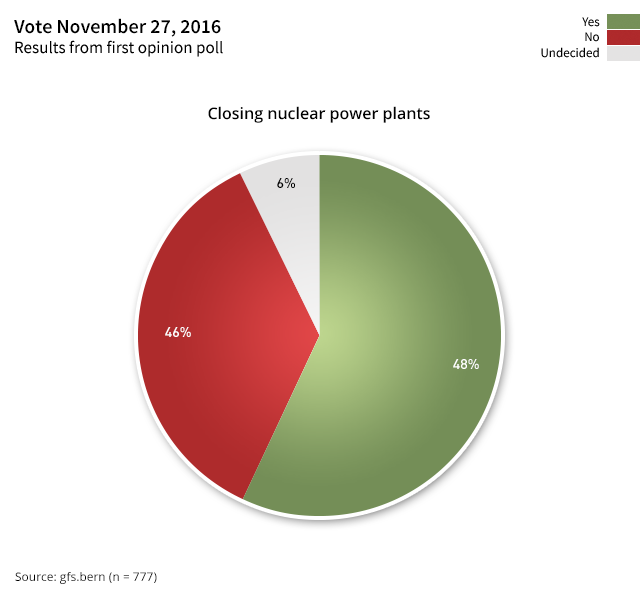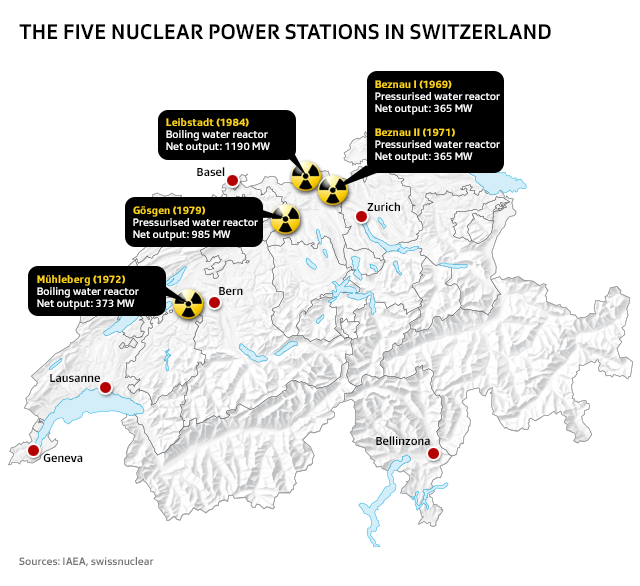
Poll finds support for nuclear phaseout

A proposal to decommission Switzerland’s nuclear power plants by 2029 has the backing of a majority of citizens, according to a survey conducted seven weeks ahead of a nationwide vote. Despite this, pollsters believe the initiative is likely to be defeated on November 27.
Supporters of the Green Party proposal had a 21% lead over opponents seven weeks before polling day, while 7% of respondents were undecided, results published on Friday showed.
“The political left, women and citizens in the French-speaking part of the country are in favour,” said Claude Longchamp of the leading GfS Bern research and polling institute.

Supporters face a strong alliance of opponents, including centre-right parties, parliament, the government and the business community.
Longchamp said the grassroots of the centrist Christian Democrats are likely to play a key role.
“Nevertheless, in a normal scenario, the initiative is set to fail,” he concludes. “The current level of support will most likely slump, unless there is a massive turnout.”
However, up to now pollsters have not found any indication that participation will rise above an average of 45% of registered voters.
Potential victory
Over the years Swiss voters have been asked numerous times to decide on nuclear power issues, both at national and cantonal level.
Of the six nationwide votes since 1979, one ended in victory for anti-nuclear campaigners who were calling for a moratorium on the construction of new plants, while three others resulted in relatively close defeats. These were influenced by serious incidents involving nuclear reactors in Harrisburg, in the United States, and Chernobyl in the Ukraine.
However, the last two ballot box decisions on nuclear power in Switzerland saw overwhelming majorities in favour of nuclear power in 2003.
The relatively frequent number of votes on the issue contribute to a comparatively high number of people who say they have already made up their minds, according to Longchamp.
Energy policy
The latest vote takes place following parliament’s approval of the government’s energy strategy, known as Energy 2050.
This plan foresees a boost to renewable energy sources at the expense of nuclear power and was introduced following a nuclear accident in Fukushima in Japan in 2011.
The Energy 2050 package sets no deadlines for the five nuclear reactors in Switzerland to be taken off the grid. But it bans the construction of new plants.

It is not clear whether voters will also have the final say on the energy policy package in the near future, as the rightwing Swiss People’s Party has launched a campaign for a referendum, hoping to collect at least 50,000 signatures by next January.
Campaign
In the early stages of the campaign, supporters and opponents have clashed over the practical implications of a possible nuclear phase out.Rows over advertisements and funding issues have also made the news headlines.
Longchamp expects heated debates over the next few weeks.
“Both sides use fear as an argument in their campaigns. They warn either of a potential nuclear disaster or caution against a shortage of clean energy supplies from other countries,” he said.
Calls for possible compensation payments by power companies or the temporary closures of two of the country’s five reactors for safety reasons could also have an impact.
Pollsters interviewed 1,200 Swiss citizens from all language regions across the country for the first of two nationwide surveys by the GfS Bern research institute ahead of the November 27 vote.
Swiss expatriates are not included in the poll.
The telephone interviews, both with fixed line and mobile phone users, took place from October 3-14.
The margin of error is 2.9%.
The survey was commissioned by the Swiss Broadcasting Corporation, swissinfo’s parent company, and carried out by the leading GfS Bern research and polling institute.

In compliance with the JTI standards
More: SWI swissinfo.ch certified by the Journalism Trust Initiative






























You can find an overview of ongoing debates with our journalists here . Please join us!
If you want to start a conversation about a topic raised in this article or want to report factual errors, email us at english@swissinfo.ch.